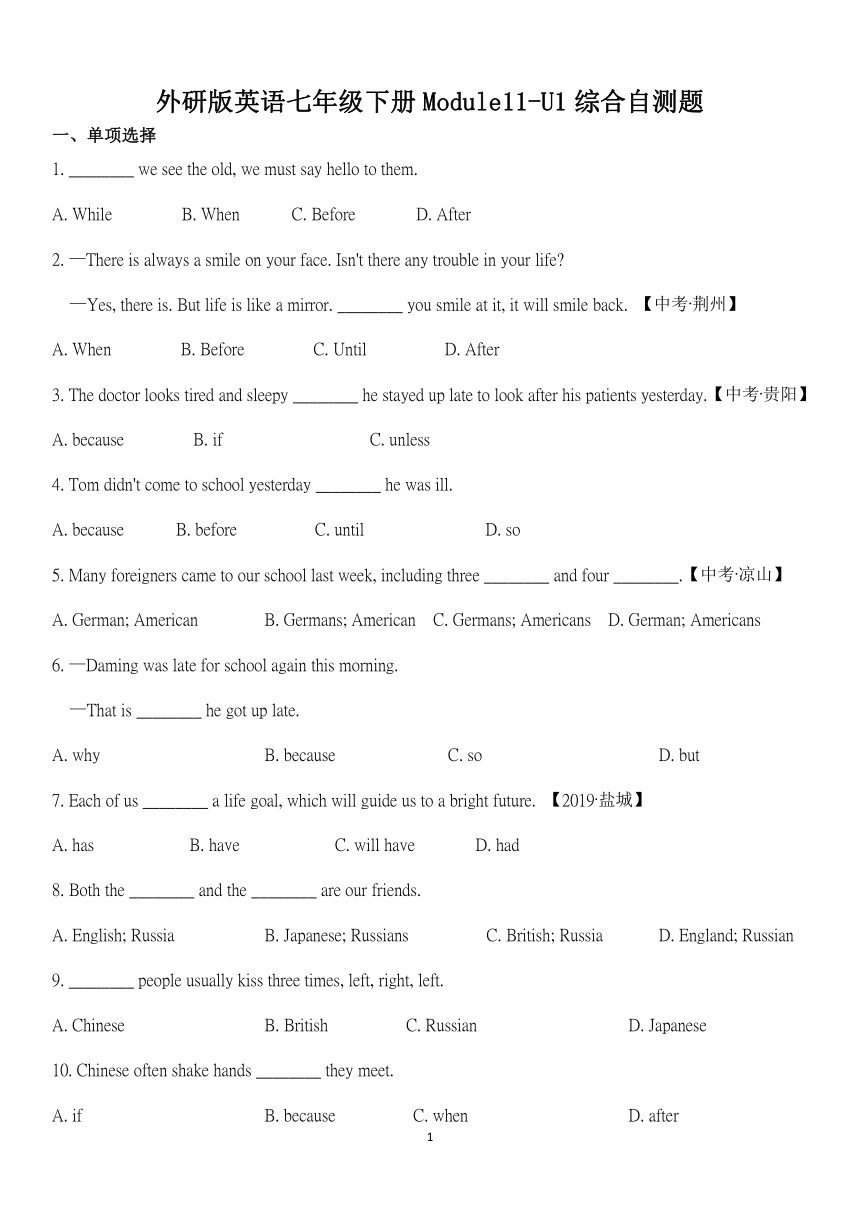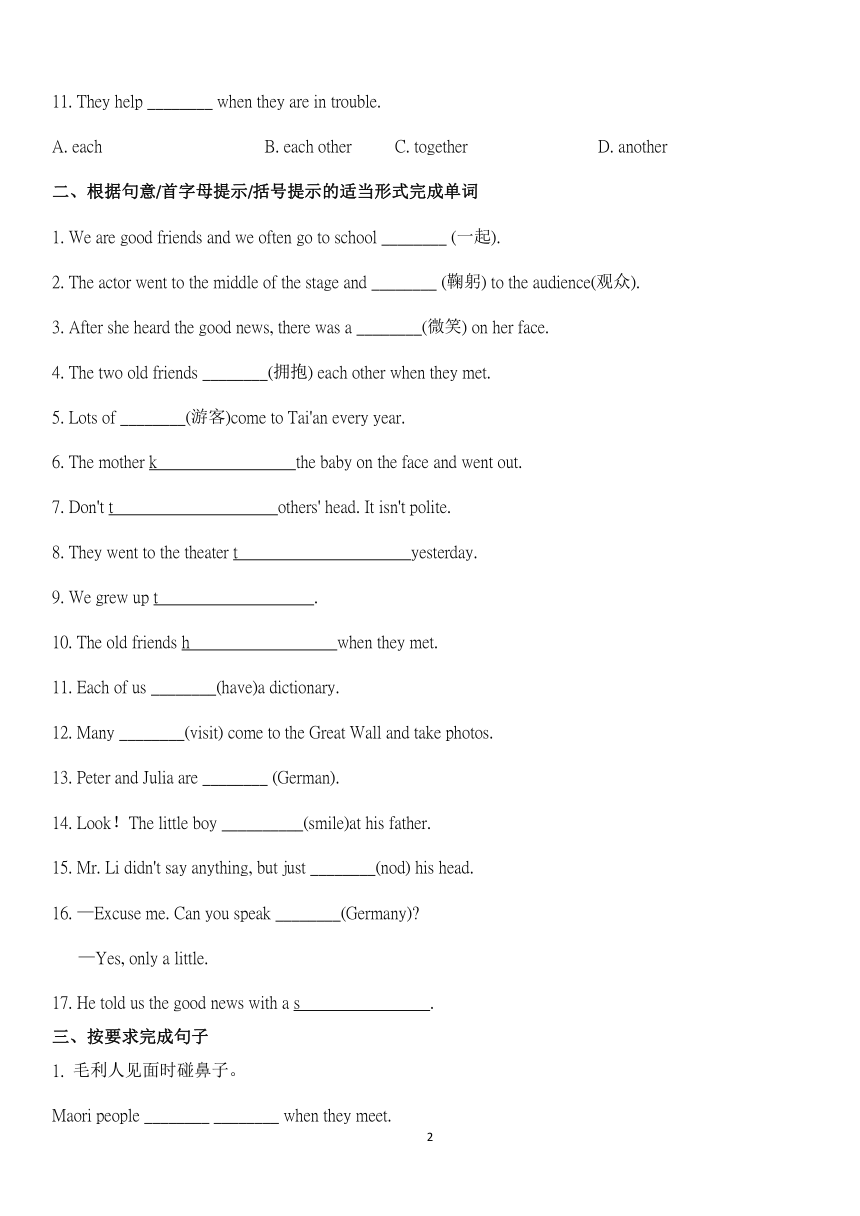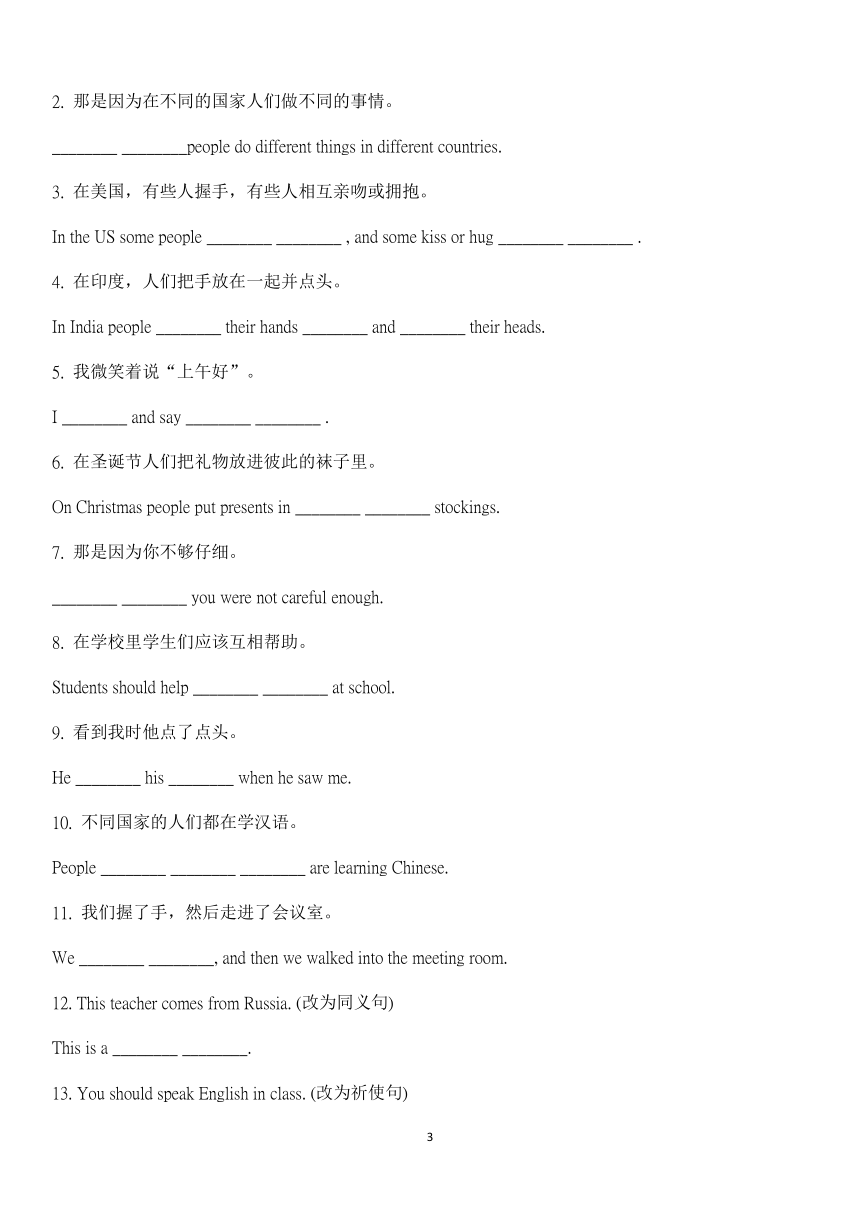外研版英语七年级下册Module 11 Body language Unit 1 They touch noses!综合自测题(含答案)
文档属性
| 名称 | 外研版英语七年级下册Module 11 Body language Unit 1 They touch noses!综合自测题(含答案) |

|
|
| 格式 | zip | ||
| 文件大小 | 21.9KB | ||
| 资源类型 | 教案 | ||
| 版本资源 | 外研版 | ||
| 科目 | 英语 | ||
| 更新时间 | 2020-06-05 00:00:00 | ||
图片预览



文档简介
外研版英语七年级下册Module11-U1综合自测题
一、单项选择
1.
________
we
see
the
old,
we
must
say
hello
to
them.
A.
While
B.
When
C.
Before
D.
After
2.
—There
is
always
a
smile
on
your
face.
Isn't
there
any
trouble
in
your
life?
—Yes,
there
is.
But
life
is
like
a
mirror.
________
you
smile
at
it,
it
will
smile
back.
【中考·荆州】
A.
When
B.
Before
C.
Until
D.
After
3.
The
doctor
looks
tired
and
sleepy
________
he
stayed
up
late
to
look
after
his
patients
yesterday.【中考·贵阳】
A.
because
B.
if
C.
unless
4.
Tom
didn't
come
to
school
yesterday
________
he
was
ill.
A.
because
B.
before
C.
until
D.
so
5.
Many
foreigners
came
to
our
school
last
week,
including
three
________
and
four
________.【中考·凉山】
A.
German;
American
B.
Germans;
American
C.
Germans;
Americans
D.
German;
Americans
6.
—Daming
was
late
for
school
again
this
morning.
—That
is
________
he
got
up
late.
A.
why
B.
because
C.
so
D.
but
7.
Each
of
us
________
a
life
goal,
which
will
guide
us
to
a
bright
future.
【2019·盐城】
A.
has
B.
have
C.
will
have
D.
had
8.
Both
the
________
and
the
________
are
our
friends.
A.
English;
Russia
B.
Japanese;
Russians
C.
British;
Russia
D.
England;
Russian
9.
________
people
usually
kiss
three
times,
left,
right,
left.
A.
Chinese
B.
British
C.
Russian
D.
Japanese
10.
Chinese
often
shake
hands
________
they
meet.
A.
if
B.
because
C.
when
D.
after
11.
They
help
________
when
they
are
in
trouble.
A.
each
B.
each
other
C.
together
D.
another
二、根据句意/首字母提示/括号提示的适当形式完成单词
1.
We
are
good
friends
and
we
often
go
to
school
________
(一起).
2.
The
actor
went
to
the
middle
of
the
stage
and
________
(鞠躬)
to
the
audience(观众).
3.
After
she
heard
the
good
news,
there
was
a
________(微笑)
on
her
face.
4.
The
two
old
friends
________(拥抱)
each
other
when
they
met.
5.
Lots
of
________(游客)come
to
Tai'an
every
year.
6.
The
mother
k
the
baby
on
the
face
and
went
out.
7.
Don't
t
others'
head.
It
isn't
polite.
8.
They
went
to
the
theater
t
yesterday.
9.
We
grew
up
t
.
10.
The
old
friends
h
when
they
met.
11.
Each
of
us
________(have)a
dictionary.
12.
Many
________(visit)
come
to
the
Great
Wall
and
take
photos.
13.
Peter
and
Julia
are
________
(German).
14.
Look!The
little
boy
__________(smile)at
his
father.
15.
Mr.
Li
didn't
say
anything,
but
just
________(nod)
his
head.
16.
—Excuse
me.
Can
you
speak
________(Germany)?
—Yes,
only
a
little.
17.
He
told
us
the
good
news
with
a
s
.
三、按要求完成句子
1.
毛利人见面时碰鼻子。
Maori
people
________
________
when
they
meet.
2.
那是因为在不同的国家人们做不同的事情。
________
________people
do
different
things
in
different
countries.
3.
在美国,有些人握手,有些人相互亲吻或拥抱。
In
the
US
some
people
________
________
,
and
some
kiss
or
hug
________
________
.
4.
在印度,人们把手放在一起并点头。
In
India
people
________
their
hands
________
and
________
their
heads.
5.
我微笑着说“上午好”。
I
________
and
say
________
________
.
6.
在圣诞节人们把礼物放进彼此的袜子里。
On
Christmas
people
put
presents
in
________
________
stockings.
7.
那是因为你不够仔细。
________
________
you
were
not
careful
enough.
8.
在学校里学生们应该互相帮助。
Students
should
help
________
________
at
school.
9.
看到我时他点了点头。
He
________
his
________
when
he
saw
me.
10.
不同国家的人们都在学汉语。
People
________
________
________
are
learning
Chinese.
11.
我们握了手,然后走进了会议室。
We
________
________,
and
then
we
walked
into
the
meeting
room.
12.
This
teacher
comes
from
Russia.
(改为同义句)
This
is
a
________
________.
13.
You
should
speak
English
in
class.
(改为祈使句)
________
________
English
in
class.
14.
She
is
learning
Russian.
(就画线部分提问)
________
________
she
________?
15.
They
each
met
us
yesterday.
(改为同义句)
________
________
them
met
us
yesterday.
16.
I
go
swimming
three
times
a
week.
(就画线部分提问)
________
________
________
you
go
swimming?
四、情景交际
A.
They
shake
hands?
B.
They
touch
noses!
C.
Tell
me
something
more.
D.
How
do
they
do
that?
E.
Do
they
kiss
when
they
meet?
F.
Do
you
know
Maori
people
in
New
Zealand?
G.
Why
do
they
do
that?
John:Judy,
what
are
you
doing?
Judy:I'm
writing
a
report
about
how
people
in
different
countries
greet
others.
John:Wow,
sounds
interesting.
________1
Judy:OK.
Do
you
know
what
Russian
people
do
when
meeting
others?
John:I
don't
know.
_____2
Judy:No,
they
kiss.
John:Ha!
______3
Judy:They
usually
kiss
three
times,
left,
right
and
left.
John:Interesting!
Are
there
any
other
interesting
things?
Judy:Yes,
of
course.
_____4
John:No!
What
do
they
do
when
greeting
others?
Judy:_____5
John:What?
It's
funny!
答案:
一、1
B
【点拨】考查when与while的区别。while引导的从句中动词一般为延续性动词。分析题目可知选B项。
2
A
【点拨】考查连词辨析。when
当……时候;before在……之前;until直到……为止;after在……之后。由“但是生活就像一面镜子,当你朝着它微笑的时候,它也会报以微笑。”可知,表示“当……时候”,应用when。故选
A。
3
A
【点拨】考查连词。句意为“这位医生看起来又困又累,因为他昨天熬夜照顾病号了”。stayed
up
late
“熬夜”是又困又累的原因,用because引导原因状语从句,故选A。
4
A
5
C
【点拨】考查名词复数。表示某国人的名词单复数变化规则:中日不变,英法变,其余?s加后面。German
德国人,复数形式为后面加?s,
American美国人,复数形式也是后面加?s。故答案选C。
6
B
7
A
【点拨】考查each的用法。each作主语时,谓语动词用单数。
8
B
【点拨】考查名词的数。Japanese意为“日本人”,其复数为原形;Russian意为“俄罗斯人”,其复数为Russians。
9
C
10
C
11
B
二、1-5
together,
bowed,
smile,
hugged,
visitors;
6-10
kissed【点拨】kiss意思为“亲吻”
。这里指妈妈吻了吻婴儿的脸。注意用过去式,
touch,
together【点拨】together意思为“一起”,
together,
hugged【点拨】hug意思为“拥抱”,过去式为hugged;
11-17
has【点拨】考查主谓一致。each作主语时谓语动词用单数,
visitors,
Germans【点拨】German意思为“德国人”,复数为Germans,
is
smiling,
nodded,
German【点拨】German意思为“德语”,为不可数名词,
smile【点拨】with
a
smile意为“面带笑容”
三、1-5
touch
noses,
That’s
because,
shake
hands
each
other,
put
together
nod,
smile
good
morning;
6-10
each
other’s,
That’s
because,
each
other,
nodded
head,
in
different
countries;
11-16
shook
hands,
Russian
teacher,
Please
speak,
What
is
doing,
Each
of【点拨】they
each相当于each
of
them,
How
often
do【点拨】对频率提问用how
often
四、CADFB
1
一、单项选择
1.
________
we
see
the
old,
we
must
say
hello
to
them.
A.
While
B.
When
C.
Before
D.
After
2.
—There
is
always
a
smile
on
your
face.
Isn't
there
any
trouble
in
your
life?
—Yes,
there
is.
But
life
is
like
a
mirror.
________
you
smile
at
it,
it
will
smile
back.
【中考·荆州】
A.
When
B.
Before
C.
Until
D.
After
3.
The
doctor
looks
tired
and
sleepy
________
he
stayed
up
late
to
look
after
his
patients
yesterday.【中考·贵阳】
A.
because
B.
if
C.
unless
4.
Tom
didn't
come
to
school
yesterday
________
he
was
ill.
A.
because
B.
before
C.
until
D.
so
5.
Many
foreigners
came
to
our
school
last
week,
including
three
________
and
four
________.【中考·凉山】
A.
German;
American
B.
Germans;
American
C.
Germans;
Americans
D.
German;
Americans
6.
—Daming
was
late
for
school
again
this
morning.
—That
is
________
he
got
up
late.
A.
why
B.
because
C.
so
D.
but
7.
Each
of
us
________
a
life
goal,
which
will
guide
us
to
a
bright
future.
【2019·盐城】
A.
has
B.
have
C.
will
have
D.
had
8.
Both
the
________
and
the
________
are
our
friends.
A.
English;
Russia
B.
Japanese;
Russians
C.
British;
Russia
D.
England;
Russian
9.
________
people
usually
kiss
three
times,
left,
right,
left.
A.
Chinese
B.
British
C.
Russian
D.
Japanese
10.
Chinese
often
shake
hands
________
they
meet.
A.
if
B.
because
C.
when
D.
after
11.
They
help
________
when
they
are
in
trouble.
A.
each
B.
each
other
C.
together
D.
another
二、根据句意/首字母提示/括号提示的适当形式完成单词
1.
We
are
good
friends
and
we
often
go
to
school
________
(一起).
2.
The
actor
went
to
the
middle
of
the
stage
and
________
(鞠躬)
to
the
audience(观众).
3.
After
she
heard
the
good
news,
there
was
a
________(微笑)
on
her
face.
4.
The
two
old
friends
________(拥抱)
each
other
when
they
met.
5.
Lots
of
________(游客)come
to
Tai'an
every
year.
6.
The
mother
k
the
baby
on
the
face
and
went
out.
7.
Don't
t
others'
head.
It
isn't
polite.
8.
They
went
to
the
theater
t
yesterday.
9.
We
grew
up
t
.
10.
The
old
friends
h
when
they
met.
11.
Each
of
us
________(have)a
dictionary.
12.
Many
________(visit)
come
to
the
Great
Wall
and
take
photos.
13.
Peter
and
Julia
are
________
(German).
14.
Look!The
little
boy
__________(smile)at
his
father.
15.
Mr.
Li
didn't
say
anything,
but
just
________(nod)
his
head.
16.
—Excuse
me.
Can
you
speak
________(Germany)?
—Yes,
only
a
little.
17.
He
told
us
the
good
news
with
a
s
.
三、按要求完成句子
1.
毛利人见面时碰鼻子。
Maori
people
________
________
when
they
meet.
2.
那是因为在不同的国家人们做不同的事情。
________
________people
do
different
things
in
different
countries.
3.
在美国,有些人握手,有些人相互亲吻或拥抱。
In
the
US
some
people
________
________
,
and
some
kiss
or
hug
________
________
.
4.
在印度,人们把手放在一起并点头。
In
India
people
________
their
hands
________
and
________
their
heads.
5.
我微笑着说“上午好”。
I
________
and
say
________
________
.
6.
在圣诞节人们把礼物放进彼此的袜子里。
On
Christmas
people
put
presents
in
________
________
stockings.
7.
那是因为你不够仔细。
________
________
you
were
not
careful
enough.
8.
在学校里学生们应该互相帮助。
Students
should
help
________
________
at
school.
9.
看到我时他点了点头。
He
________
his
________
when
he
saw
me.
10.
不同国家的人们都在学汉语。
People
________
________
________
are
learning
Chinese.
11.
我们握了手,然后走进了会议室。
We
________
________,
and
then
we
walked
into
the
meeting
room.
12.
This
teacher
comes
from
Russia.
(改为同义句)
This
is
a
________
________.
13.
You
should
speak
English
in
class.
(改为祈使句)
________
________
English
in
class.
14.
She
is
learning
Russian.
(就画线部分提问)
________
________
she
________?
15.
They
each
met
us
yesterday.
(改为同义句)
________
________
them
met
us
yesterday.
16.
I
go
swimming
three
times
a
week.
(就画线部分提问)
________
________
________
you
go
swimming?
四、情景交际
A.
They
shake
hands?
B.
They
touch
noses!
C.
Tell
me
something
more.
D.
How
do
they
do
that?
E.
Do
they
kiss
when
they
meet?
F.
Do
you
know
Maori
people
in
New
Zealand?
G.
Why
do
they
do
that?
John:Judy,
what
are
you
doing?
Judy:I'm
writing
a
report
about
how
people
in
different
countries
greet
others.
John:Wow,
sounds
interesting.
________1
Judy:OK.
Do
you
know
what
Russian
people
do
when
meeting
others?
John:I
don't
know.
_____2
Judy:No,
they
kiss.
John:Ha!
______3
Judy:They
usually
kiss
three
times,
left,
right
and
left.
John:Interesting!
Are
there
any
other
interesting
things?
Judy:Yes,
of
course.
_____4
John:No!
What
do
they
do
when
greeting
others?
Judy:_____5
John:What?
It's
funny!
答案:
一、1
B
【点拨】考查when与while的区别。while引导的从句中动词一般为延续性动词。分析题目可知选B项。
2
A
【点拨】考查连词辨析。when
当……时候;before在……之前;until直到……为止;after在……之后。由“但是生活就像一面镜子,当你朝着它微笑的时候,它也会报以微笑。”可知,表示“当……时候”,应用when。故选
A。
3
A
【点拨】考查连词。句意为“这位医生看起来又困又累,因为他昨天熬夜照顾病号了”。stayed
up
late
“熬夜”是又困又累的原因,用because引导原因状语从句,故选A。
4
A
5
C
【点拨】考查名词复数。表示某国人的名词单复数变化规则:中日不变,英法变,其余?s加后面。German
德国人,复数形式为后面加?s,
American美国人,复数形式也是后面加?s。故答案选C。
6
B
7
A
【点拨】考查each的用法。each作主语时,谓语动词用单数。
8
B
【点拨】考查名词的数。Japanese意为“日本人”,其复数为原形;Russian意为“俄罗斯人”,其复数为Russians。
9
C
10
C
11
B
二、1-5
together,
bowed,
smile,
hugged,
visitors;
6-10
kissed【点拨】kiss意思为“亲吻”
。这里指妈妈吻了吻婴儿的脸。注意用过去式,
touch,
together【点拨】together意思为“一起”,
together,
hugged【点拨】hug意思为“拥抱”,过去式为hugged;
11-17
has【点拨】考查主谓一致。each作主语时谓语动词用单数,
visitors,
Germans【点拨】German意思为“德国人”,复数为Germans,
is
smiling,
nodded,
German【点拨】German意思为“德语”,为不可数名词,
smile【点拨】with
a
smile意为“面带笑容”
三、1-5
touch
noses,
That’s
because,
shake
hands
each
other,
put
together
nod,
smile
good
morning;
6-10
each
other’s,
That’s
because,
each
other,
nodded
head,
in
different
countries;
11-16
shook
hands,
Russian
teacher,
Please
speak,
What
is
doing,
Each
of【点拨】they
each相当于each
of
them,
How
often
do【点拨】对频率提问用how
often
四、CADFB
1
同课章节目录
- Module 1 Lost and found
- Unit 1 Whose bag is this?
- Unit 2 Are they yours?
- Unit 3 Language in use
- Module 2 What can you do ?
- Unit 1 I can play the piano
- Unit 2 I can run really fast
- Unit 3 Language in use
- Module 3 Making plans
- Unit 1 What are you going to do at the weekends?
- Unit 2 We're going to cheer the players.
- Unit 3 Language in use
- Module 4 Life in the future
- Unit 1 Everyone will study at home
- Unit 2 Every family will have a small plane.
- Unit 3 Language in use
- Module 5 Shopping
- Unit 1 What can I do for you?
- Unit 2 You can buy everything on the Internet
- Unit 3 Language in use
- Module 6 Around town
- Unit 1 Could you tell me how to get to the Nationa
- Unit 2 The London Eye is on your right.
- Unit 3 Language in use
- Revision module A
- Module 7 My past life
- Unit 1 I was born in a small village.
- Unit 2 I was born in Quincy.
- Unit 3 Language in use
- Module 8 Story time
- Unit 1 Once upon a time….
- Unit 2 Goldilocks hurried out of the house.
- Unit 3 Language in use
- Module 9 Life history
- Unit 1 He left school and began work at the age of
- Unit 2 He decided to be an actor.
- Unit 3 Language in use
- Module 10 A holiday journey
- Unit 1 What did you do?
- Unit 2 This morning we took a walk.
- Unit 3 Language in use
- Module 11 Body language
- Unit 1 They touch noses!
- Unit 2 Here are some ways to welcome them.
- Unit 3 Language in use
- Module 12 Western music
- Unit 1 It's so beautiful!
- Unit 2 Vienna is the centre of European classical
- Unit 3 Language in use
- Revision module B
